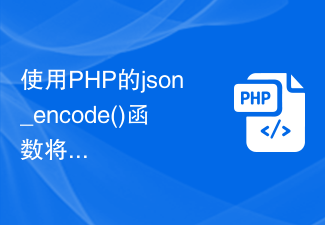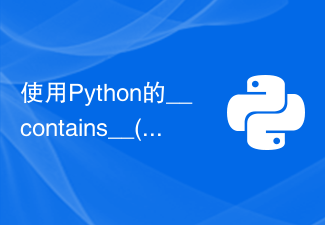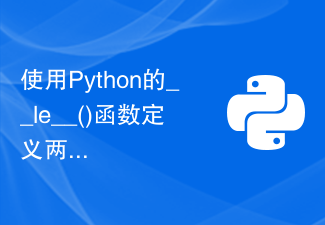Php object-oriented – singleton pattern
Php object-oriented – singleton pattern
Guaranteed class has only one instance
1. How to solve the problem that a class can be instantiated infinitely?
New can be instantiated once. How to limit it? Users cannot use new unlimited times?
Private the constructor. All external new operations fail
class MySQLDB
{
private function __construct()
{
}
}
2. Once the constructor is privatized, it means that the class cannot be instantiated outside the class. But it can be instantiated within the class.
Add a public static method, call the method through the class, and perform new operations within the method.
class MySQLDB
{
private function __construct()
{
}
public static function getInstance()
{
return new MySQLDB;
}
}
$o = MySQLDB::getInstance();
At this time, when the user needs an object of this class, the code in the method will be executed. Therefore, we can limit the user's operation of obtaining the object by improving the logic within the method.
3. In the above method, use the following logic: make a judgment every time it is executed to determine whether the class has instantiated the object. If it has instantiated the object, directly return the instantiated object. If not instantiated, instantiate a new one and return.
How to judge?
Save this object when it is instantiated.
Example:
class MySQLDB
{
private static $instance;
private function __construct()
{
}
public static function getInstance()
{
if(!self::$instance instanceof self)
{
self::$instance= new self;
}
return self::$instance;
}
}
4. Cloning can also get new objects, so cloning needs to be restricted.
Private __clone() method
class MySQLDB
{
private static $instance;
private function __construct()
{
}
private function __clone()
{
}
public static function getInstance()
{
if(!self::$instance instanceof self)
{
self::$instance= new self;
}
return self::$instance;
}
}
 使用PHP的json_encode()函数将数组或对象转换为JSON字符串Nov 03, 2023 pm 03:30 PM
使用PHP的json_encode()函数将数组或对象转换为JSON字符串Nov 03, 2023 pm 03:30 PMJSON(JavaScriptObjectNotation)是一种轻量级的数据交换格式,已经成为Web应用程序之间数据交换的常用格式。PHP的json_encode()函数可以将数组或对象转换为JSON字符串。本文将介绍如何使用PHP的json_encode()函数,包括语法、参数、返回值以及具体的示例。语法json_encode()函数的语法如下:st
 源码探秘:Python 中对象是如何被调用的?May 11, 2023 am 11:46 AM
源码探秘:Python 中对象是如何被调用的?May 11, 2023 am 11:46 AM楔子我们知道对象被创建,主要有两种方式,一种是通过Python/CAPI,另一种是通过调用类型对象。对于内置类型的实例对象而言,这两种方式都是支持的,比如列表,我们即可以通过[]创建,也可以通过list(),前者是Python/CAPI,后者是调用类型对象。但对于自定义类的实例对象而言,我们只能通过调用类型对象的方式来创建。而一个对象如果可以被调用,那么这个对象就是callable,否则就不是callable。而决定一个对象是不是callable,就取决于其对应的类型对象中是否定义了某个方法。如
 使用Python的__contains__()函数定义对象的包含操作Aug 22, 2023 pm 04:23 PM
使用Python的__contains__()函数定义对象的包含操作Aug 22, 2023 pm 04:23 PM使用Python的__contains__()函数定义对象的包含操作Python是一种简洁而强大的编程语言,提供了许多强大的功能来处理各种类型的数据。其中之一是通过定义__contains__()函数来实现对象的包含操作。本文将介绍如何使用__contains__()函数来定义对象的包含操作,并且给出一些示例代码。__contains__()函数是Pytho
 使用Python的__le__()函数定义两个对象的小于等于比较Aug 21, 2023 pm 09:29 PM
使用Python的__le__()函数定义两个对象的小于等于比较Aug 21, 2023 pm 09:29 PM标题:使用Python的__le__()函数定义两个对象的小于等于比较在Python中,我们可以通过使用特殊方法来定义对象之间的比较操作。其中之一就是__le__()函数,它用于定义小于等于比较。__le__()函数是Python中的一个魔法方法,并且是一种用于实现“小于等于”操作的特殊函数。当我们使用小于等于运算符(<=)比较两个对象时,Python
 详解Javascript对象的5种循环遍历方法Aug 04, 2022 pm 05:28 PM
详解Javascript对象的5种循环遍历方法Aug 04, 2022 pm 05:28 PMJavascript对象如何循环遍历?下面本篇文章给大家详细介绍5种JS对象遍历方法,并浅显对比一下这5种方法,希望对大家有所帮助!
 Python中如何使用getattr()函数获取对象的属性值Aug 22, 2023 pm 03:00 PM
Python中如何使用getattr()函数获取对象的属性值Aug 22, 2023 pm 03:00 PMPython中如何使用getattr()函数获取对象的属性值在Python编程中,我们经常会遇到需要获取对象属性值的情况。Python提供了一个内置函数getattr()来帮助我们实现这个目标。getattr()函数允许我们通过传递对象和属性名称作为参数来获取该对象的属性值。本文将详细介绍getattr()函数的用法,并提供实际的代码示例,以便更好地理解。g
 使用Python的isinstance()函数判断对象是否属于某个类Aug 22, 2023 am 11:52 AM
使用Python的isinstance()函数判断对象是否属于某个类Aug 22, 2023 am 11:52 AM使用Python的isinstance()函数判断对象是否属于某个类在Python中,我们经常需要判断一个对象是否属于某个特定的类。为了方便地进行类别判断,Python提供了一个内置函数isinstance()。本文将介绍isinstance()函数的用法,并提供代码示例。isinstance()函数可以判断一个对象是否属于指定的类或类的派生类。它的语法如下
 PHP代码封装技巧:如何使用类和对象封装可重复使用的代码块Jul 29, 2023 pm 11:19 PM
PHP代码封装技巧:如何使用类和对象封装可重复使用的代码块Jul 29, 2023 pm 11:19 PMPHP代码封装技巧:如何使用类和对象封装可重复使用的代码块摘要:在开发中,经常遇到需要重复使用的代码块。为了提高代码的可维护性和可重用性,我们可以使用类和对象的封装技巧来对这些代码块进行封装。本文将介绍如何使用类和对象封装可重复使用的代码块,并提供几个具体的代码示例。使用类和对象的封装优势使用类和对象的封装有以下几个优势:1.1提高代码的可维护性通过将重复


Hot AI Tools

Undresser.AI Undress
AI-powered app for creating realistic nude photos

AI Clothes Remover
Online AI tool for removing clothes from photos.

Undress AI Tool
Undress images for free

Clothoff.io
AI clothes remover

AI Hentai Generator
Generate AI Hentai for free.

Hot Article

Hot Tools

Atom editor mac version download
The most popular open source editor

mPDF
mPDF is a PHP library that can generate PDF files from UTF-8 encoded HTML. The original author, Ian Back, wrote mPDF to output PDF files "on the fly" from his website and handle different languages. It is slower than original scripts like HTML2FPDF and produces larger files when using Unicode fonts, but supports CSS styles etc. and has a lot of enhancements. Supports almost all languages, including RTL (Arabic and Hebrew) and CJK (Chinese, Japanese and Korean). Supports nested block-level elements (such as P, DIV),

SublimeText3 Linux new version
SublimeText3 Linux latest version

VSCode Windows 64-bit Download
A free and powerful IDE editor launched by Microsoft

ZendStudio 13.5.1 Mac
Powerful PHP integrated development environment







